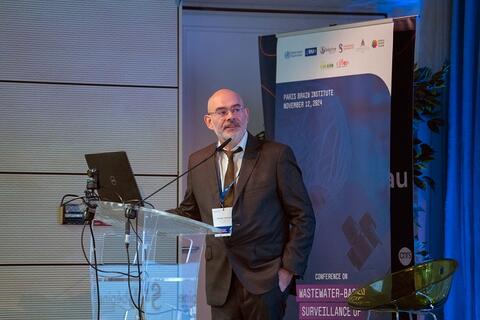
From “pre-bunking” to patient care: an interview with Prof. Karine Lacombe on PROACT in EU-RESPONSE
Professor Karine Lacombe is a renowned expert in infectious diseases. She is a professor at the Faculty of Health Sciences at Sorbonne University, and head of the Department of Infectious and Tropical Diseases at Saint-Antoine Hospital. We took some time with her to learn more about the PROACT in EU-RESPONSE project and its significance in pandemic preparedness and response.
What is PROACT in EU-RESPONSE?
PROACT in EU-RESPONSE is a European project aimed at better preparing Europe for responding to future pandemics through research, particularly the evaluation of new drugs. Its goals include understanding diseases caused by potential new infectious agents, providing a rapid and coordinated response to pandemic threats, and efficiently evaluating new medications so they can quickly reach patients.
The project establishes partnerships in clinical research and networks of laboratories across Europe to ensure a coordinated and effective response to future pandemics.
The aim is to rapidly and effectively evaluate new drugs so they can be delivered to patients as soon as possible. This requires a coordinated approach, combining clinical research and laboratory networks across Europe.
Was this initiative prompted by COVID-19?
Yes, PROACT in EU-RESPONSE stems from lessons learned during the COVID-19 pandemic. Despite having world-class scientists in Europe, the pandemic response faced delays, such as the six-month wait for the first clinical drug trials in Europe. Initially, the European Union created and funded a network called EU RESPONSE. PROACT builds on this foundation by expanding its reach to more countries and laboratories, increasing its capacity.
We learned during the pandemic that despite our strengths, there were significant delays in setting up clinical trials. EU RESPONSE was the first step, and PROACT in EU-RESPONSE takes it further by amplifying and extending our reach.
Additionally, the project introduces new activities, particularly in social sciences, to understand resistance to public health measures, counter misinformation, and adapt communication strategies during pandemics. Social scientists as well patients and citizen associations are now part of the project to help us better understand and combat misinformation.
Speaking of misinformation, how can we use communication to combat it?
“Pre-bunking” is a proactive approach central to PROACT’s strategy against misinformation. It focuses on preparing the public to resist false narratives before they gain attraction, rather than attempting to correct them after the damage is done. This involves analyzing social media to detect early signals of misinformation and collaborating with patient associations and citizen groups to craft messages rooted in scientific evidence. By educating the public and fostering a foundation of trust in science, pre-bunking creates a more resilient information environment.
During the pandemic, misinformation spread through various channels, including some alternative health practitioners exploiting public fears. To address this, PROACT will conduct population surveys across Europe to understand the sociological factors behind adherence to misinformation. This research will inform strategies for pre-bunking.
Reversing the so-called Brandolini’s law, which states that combating misinformation requires significantly more energy than spreading it, is a priority.
Your involvement in PROACT focuses on hospital care. Could you elaborate?
The core of PROACT is creating a clinical research network to respond to pandemics in hospital settings. The project focuses on inpatient care, encompassing clinical research, microbiology, and methodology. Although community and social care are critical in pandemic responses, these areas fall outside my direct scope. However, PROACT complements other European networks addressing these components.
I am primarily focused on inpatient care. This involves everything from microbiological research to designing therapeutic trials.
What role does digital health play in PROACT?
Within PROACT, digital health is leveraged through artificial intelligence (AI) to predict drug responses based on medical, sociodemographic, and pathogen-related parameters. This approach aims to identify the most effective treatments rapidly.
AI allows us to predict drug effectiveness based on a variety of factors. This is crucial for tailoring responses to specific pathogens and patient demographics. AI will also be used to better tailor approaches of pre-bunking based on weak signals of misinformation that will be identified on social media networks, this is quite innovative!
Additionally, outside PROACT, the coordinator is involved in developing a digital health app for improving adherence to HIV treatments. This app will help patients struggling with treatment adherence by providing tailored support.
What are the next steps for EU-PROACT following its funding approval?
PROACT in EU-RESPONSE has secured €17 million in European Union funding, with 23 partners across 20 countries, including Poland and Ukraine. Coordinated by Inserm and Sorbonne University, the project launches on January 1, 2025. Initial actions include:
- Strengthening and expanding a network of hospital-based clinical research centers.
- Building a methodological network of statisticians and epidemiologists to design and analyze clinical trials.
- Enhancing a Europe-wide microbiology network (VIRVOLT) in partnership with BioMérieux.
- Conducting implementation science research to understand sociological barriers to participation in therapeutic trials.
- Developing communication strategies and training modules for citizens, patient associations, and healthcare professionals to improve pandemic preparedness and counter misinformation.
During our first year, we will focus on consolidating existing networks and creating innovative approaches to trial design and data analysis. This includes exploring platform trials and emulated trials to ensure we’re ready for any pandemic scenario.
The project will test its model with therapeutic trials for respiratory viral infections, such as influenza, ensuring readiness for future pandemic threats like H5N1.
Why is international collaboration essential?
Collaboration is critical for rapid and effective pandemic responses. PROACT integrates into international networks such as STRIVE (global), PANTHER (Africa), and RECOVERY (Europe and beyond). Within Europe, it collaborates with networks such as PIPELINE which addresses specific populations, including children and women.
International partnerships strengthen pandemic understanding, infectious agent identification, disease mechanisms, and treatment responses. We are stronger together.
What does PROACT mean for Sorbonne University as an institution?
Sorbonne University’s reputation for international excellence significantly contributed to the project’s successful funding bid. PROACT positions the university as a leader in clinical and social science research in Europe, fostering public-private partnerships with biotechnology and pharmaceutical companies for innovative drug evaluations.
This project showcases Sorbonne University’s commitment to excellence and its pivotal role in advancing clinical and social science research.


